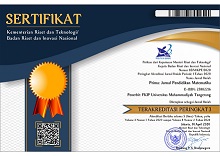PROFILE OF STUDENTS’ COMPUTATIONAL THINKING BASED ON SELF-REGULATED LEARNING IN COMPLETING BEBRAS TASKS
Abstract
Bebras task is a problem solving problem that integrates computational thinking in it, which the stages in computational thinking consist of: decomposition, abstraction, algorithm, and pattern recognition. This study aims to describe the profile of student’s computational thinking based on the level of self-regulated learning in completing bebras task. This study is a qualitative-descriptive study with three research subjects based on the level of students’ self-regulated learning, namely high self-regulated learning, medium self-regulated learning, and low self-regulated learning. The results of this study indicate that students with different levels of self-regulated learning have different computational thinking ability in completing bebras task. Student with high level of self-regulated learning can reach the stages of decomposition, abstraction, algorithm, and pattern recognition. Student with medium level of self-regulated learning can reach the stages of decomposition, absraction, and algorithm. Student with low level of self-regulated learning can reach the stage of decomposition only. Student with low level of self-regulated learning do not yet reflect independence in learning.
Keywords
Full Text:
PDFReferences
Departemen Pendidikan Nasional. 2003. Undang-undang RI No. 20 Tahun 2003 tentang Sistem Pendidikan Nasional.
Hadi, S. (2015). Metodologi Riset. Yogyakarta: Pustaka Pelajar.
Hamundu, A., Sudia, M., and Samparadja, H. (2017). Profil Pemecahan Masalah Yang Ditinjau Dari Self Regulated Learning Siswa SMP. Jurnal Pendidikan Matematika Vol. 8 No.2. Retrieved October 15, 2020, from https://www.neliti.com/publications/317591/profil-pemecahan-masalah-terbuka-yang-ditinjau-dari-self-regulated-learning-siswa.
Hendriana, H., Rohaeti, E.E., and Sumarmo, U. (2018). Hard Skills dan Soft Skills. Bandung: Refika Aditama.
Kong, S.-C., Abelson, H. (2019). Computational Thinking Education. Singapore: SpringerOne.
Kristiyani, T. (2016). Self-Regulated Learning Konsep Implikasi dan Tantangannya bagi Siswa di Indonesia. Yogyakarta: Sanata Dharma University Press.
Kusumaningtyas, Y.A.W. (2017). Peningkatan Kemampuan Pemecahan Masalah dan Hasil Belajar Matematika dengan Metode Problem Solving (PTK Siswa Kelas IX F SMP Negeri 1 Colomadu Tahun Ajaran 2016/2017). Skripsi FKIP Universitas Muhammadiyah Surakarta: tidak diterbitkan.
Mawardi. (2016. Ilmu Pendidikan. Jakarta: Yayasan Mirqot Ilmiah Al-Itqon.
Magisrahayu. (2019). Berpikir Komputasional. Jakarta: Kementerian Pendidikan dan Kebudayaan.
Moleong, L. J. (2017). Metodologi Penelitian Kualitatif. Bandung: Remaja Rosdakarya.
Mudyahardjo, R. (2012). Filsafat Ilmu Pendidikan. Bandung: Remaja Rosdakarya.
Mulyadi, S., Basuki, H., Rahardjo, W. (2017). Psikologi Pendidikan. Depok: RajaGrafindo Persada.
Telaumbanua, Y.N., Sinaga, B., Surya, M.E. (2017). Development of Mathematics Module Based on Metacognitive Strategy in Improving Students’ Mathematical Problem Solving Ability at High School. Journal of Education and Practice Vol. 8 No. 19.
Tim Olimpiade Komputer Indonesia. (2017). Tantangan Bebras Indonesia 2017 Bahan Belajar Computational Thinking Tingkat SMP. NBO Bebras Indonesia.
Tim Olimpiade Komputer Indonesia. (2018). Tantangan Bebras Indonesia 2018 Bahan Belajar Computational Thinking Tingkat SMP. NBO Bebras Indonesia.
Tim Olimpiade Komputer Indonesia. (t. thn). Bebras Challenge 2019. Dipetik Januari 8, 2020, dari Bebras Indonesia: http://bebras.or.id.
Wing, J.M. (2006). Computational Thinking. Communication of The ACM Vol. 49 No. 3.
Wing, J.M. (2010). Computational Thinking. Retrieved June 23, 2020, from https://www.cs.cmu.edu/~CompThink/resources/TheLinkWing.pdf.
Yanti, S., and Surya, E. (2017). Kemandirian Belajar dalam Memaksimalkan Kualitas Pembelajaran. Retrieved September 11, 2020, from https://www.researchgate.net/publication/321833928.
DOI: http://dx.doi.org/10.31000/prima.v5i2.4173
Article Metrics
Abstract - 2967 PDF - 2053Refbacks
- There are currently no refbacks.
Prima: Jurnal Pendidikan Matematika
Program Studi Pendidikan Matematika
Fakultas Keguruan dan Ilmu Pendidikan
Universitas Muhammadiyah Tangerang
Jl. Perintis Kemerdekaan I/33, Cikokol
Kota Tangerang, Indonesia
e-mail: primajpm@gmail.com
Prima: Jurnal Pendidikan Matematika (p-ISSN: 2579-9827 | e-ISSN: 2580-2216) is licensed under a Creative Commons Attribution 4.0 International License.







